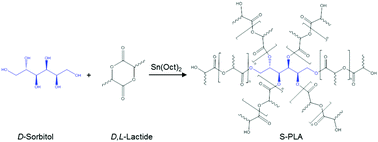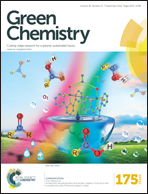Controlled polymerisation and purification of branched poly(lactic acid) surfactants in supercritical carbon dioxide†
Abstract
Product degradability, sustainability and low-toxicity are driving demand for the synthesis of biobased polymers and surfactants. Here we report the synthesis of novel surface active polymers using cyclic esters (D,L-lactide) and temperature sensitive polyols (D-sorbitol) as renewable building blocks. We highlight the modification of chain length and degree of branching to provide a route to tailoring the properties and application performance of these new compounds. High processing temperatures (≥180 °C) and harsh post-reaction treatments are often needed to remove residual monomer and catalysts and these can become barriers to creating materials based on renewable resources. Here we exploit supercritical carbon dioxide (scCO2) as a green solvent to overcome these challenges; significantly reducing reaction temperatures, targeting controlled molecular weights with narrow dispersities and reducing side-product formation. Additionally in the same pot, we can use supercritical extraction to purify the compounds and to efficiently remove unreacted reagents, which could be recovered and recycled. We believe that our approach to the production and purification of these novel branched poly(lactides) is a significant step towards the development of the next generation of biopolymers and green surfactants, combining both the use of bio-sourced raw materials and the potential to use sustainable, low energy processes and techniques.


 Please wait while we load your content...
Please wait while we load your content...